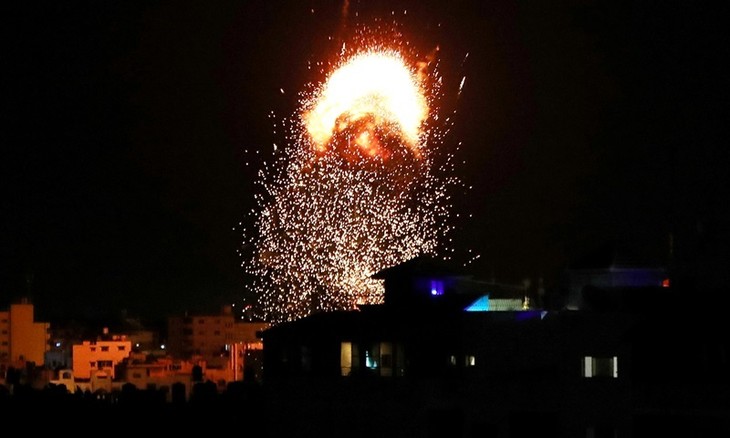(VOVWORLD) - As violence intensifies between Israel and Palestinian Hamas, the world community is trying to prevent further escalation.
 Israel's airstrike hit a house in Gaza on May 17. (photo: AFP) Israel's airstrike hit a house in Gaza on May 17. (photo: AFP) |
Clashes between Israel and Hamas in Gaza have killed hundreds of Palestinians, including women and children, injured thousands of people, and damaged houses and infrastructure. UN Secretary General Antonio Guterres described the hostilities as “utterly appalling” and said the fighting risks dragging Israelis and Palestinians into a spiral of violence with devastating consequences for both communities and for the entire region. The world community wants the violence to stop.
Effort to stop violence
The UN Security Council on May 16th convened the 3rd meeting in a week to seek measures to stop the violence. The delegates underscored the need to immediately stop all attacks.
Secretary of State Antony Blinken had separate phone conversations with his counterparts in Qatar, Egypt, and Saudi Arabia to discuss the violence between Israel and Palestine. They pledged to cooperate to obtain an immediate truce.
Blinken on Monday reaffirmed Washington’s commitment to stop the violence spike and back a ceasefire. 28 Democratic senators issued a joint statement calling for a ceasefire.
German Foreign Minister Heiko Maas on Sunday outlined a three-stage plan to deescalate the current tensions: stop the rocket attacks, put an end to the violence, and return to discussions about confidence-building steps between Israelis and Palestinians.
EU Foreign Ministers are scheduled to hold an emergency virtual meeting on ending the fighting.
French President Emmanuel Macron and Egyptian Abdel Fattah al-Sisi agreed in Paris Monday that it was "absolutely necessary" to end the hostilities. Russia, a member of the Middle East Quartet comprising the United Nations, the United States, and the European Union, has called on the Quartet to take action.
Egypt last week mediated a truce between the Israeli military and armed forces in Gaza. At a meeting with representatives from Israel and Hamas, Egyptian officials initiated an one-year ceasefire under Cairo’s oversight and collaboration.
Challenge and prospect
Unfortunately, efforts to establish a ceasefire between the Israeli military and the Palestinians have not gained any result. Fierce clashes have continued. The violence has spread to Lebanon, home of the Hezbollah movement, Israel’s archfoe and a Hamas’ ally. Monday evening, the Israeli military fired rockets into Lebanon’s southern region in retaliation for 6 rockets fired by Hezbollah toward Israel.
Analysts say the international effort has been in vain because of historical complications and deep hatred between the two sides. The Palestine-Israel conflict and between Arabs and Israel in general has been complicated by international interference. The Palestine-Israel peace process has not received sufficient attention from the international community because of the COVID-19 pandemic and because each country has concerns of higher priority.
But the global community believes there is a chance for peace and that the warning parties cannot ignore repeated calls for a ceasefire from the UN Security Council and the world’s most powerful countries, and understand that the violence will only lead to greater losses of human life, economic potential, and international prestige.